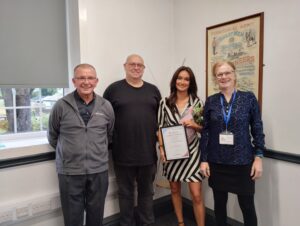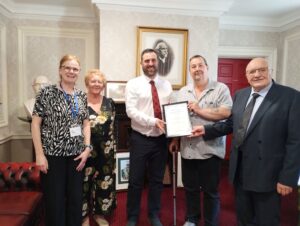The County Durham Association of Local Councils (CDALC) hopes you find this website to be informative and useful. As a membership association we are unable to deal with queries from members of the public, but we are happy to make general information available through this website. We are not a statutory body and have no powers or duties to intervene in the operation of individual councils.
The Association is owned and run by its member councils with a County Executive Committee acting as the representative body for all parish councils in the Association area. CDALC is constituted to support local councils and parish meetings in the delivery of services to their communities. It aims to:
- Provide a quality service to member councils including administrative, legal, financial and procedural advice
- Provide quality training for clerks and councillors
- Represent the voice of parish councils in policy decisions
- Achieve 100% membership of the Association
- Provide partnership working with Durham County Council and other organisations such as Police, Fire, NHS
- provide partnership working with other community groups
There are 104 parish and town council in County Durham of which 102 (98%) are in membership of the Association In addition there are five parish meetings in membership of the Association. There are 24 parish meetings in County Durham.
In other areas of the region we also have Association member parish and town councils from Sunderland City Council (1 council), Gateshead Borough Council (1 council) and Darlington Borough Council (2 councils).
Training for parish councillors and clerks is provided through the County Durham and Cleveland County Training Partnership (CTP) which is a partnership arrangement between the following bodies:
- The County Associations of Cleveland and County Durham
- Durham Community Action
- Tees Valley Rural Community Council
- Durham County Council
- The Society of Local Council Clerks (SLCC)
CDALC provides administrative support for the County Training Partnership.
Parish Councils are able to obtain one of three levels of the newly introduced Local Council Award Scheme (LCAS). The three levels of achievement are Foundation, Quality or Quality Gold.
Clerk Vacancies
Other Vacancies
Latest News
CiLCA Qualification – Sophie Taylor
Congratulations to Sophie Taylor , Coxhoe Parish Clerk, who recently obtained the prestigious CiLCA Qualification
Sophie was formally presented with her CiLCA certificate by Councillor Allan Blakemore, CDALC Honorary Treasurer, Audrey Christie , CDALC Executive Officer and Stuart Dunn , Chair Coxhoe Parish Council on Wednesday 3rd September at the Parish Council Meeting at Coxhoe.
Achieving CiLCA is an extraordinary achievement for any parish council clerk. It’s a qualification and a commitment that takes a considerable amount of time, self motivation, discipline, sacrifice and why we at CDALC want to make sure we help celebrate your success with you and your councils.
CiLCA qualified clerks are quite an elite group and particularly those who have achieved the post 2015 qualification when the previous Level 2 (GCSE) course was replaced by a Level 3 (A level standard). In Durham only 32% of Clerks have achieved this qualification. Well Done Sophie!

CiLCA Qualification – Ian Hall
Congratulations to Ian Hall, Peterlee Town Clerk, who recently obtained his prestigious CiLCA Qualification
Ian was formally presented with his CiLCA certificate by Councillor David Bell, Chair CDALC Chair and Audrey Christie , CDALC Executive Officer on Monday 21st July at the Town Council Meeting at Shotton Hall. This is a significant achievement for any Town Clerk, taking a considerable amount of time (on top of the day job!), commitment, self-motivation, discipline, and sacrifice .
CiLCA qualified clerks are quite an elite group and particularly those who have achieved the post 2015 qualification when the previous Level 2 (GCSE) course was replaced by a Level 3 (A level standard).
On average about 200 students achieve CiLCA a year and nationally only about 20% of clerks have the Level 3 qualification . Well done Ian!
For previous news and awards see below :
Startforth Parish Council awarded Foundation Council Status by NALC.
City of Durham Parish Council awarded Quality Council Status by NALC
CiLCA Qualification – Lisa Hall – Town Clerk, Hetton Town Council & Parish Clerk , Hutton Henry & Station Town
Forthcoming training events are listed on our training page.
For more information about any training events please email us at cdalc@durham.gov.uk
Section 137 Limit for 2025/26
Each year the Ministry of Housing, Communities and Local Government releases details of the appropriate sum for Section 137(4)(a) of the Local Government Act 1972 (the 1972 Act). For parish and town councils in England the 2025-6 Section 137 Limit is £11.10 per elector. For 2026/27 the limit will be £11.60 per elector.
Councillor vacancies
If you are interested in getting involved with your local parish council please check with your local council clerk to see if there are any councillor vacancies.
Ordinary elections take place every 4 years and the next are scheduled for May 2030. Any unfilled seats left over from the May 2025 elections can be filled by co-option and over time casual vacancies will also arise due to resignations, deaths etc. Depending on the circumstances casual vacancies may lead to an election but in many cases this is not necessary and the council can co-opt new members.
If you want to find out more about how you can become a councillor or clerk, or just want to find out more about parish councils in general then please see our Parish Councils and Get Involved pages to find all the information you need.
Public Participation at Meetings
The Public Bodies (Admission to Meetings) Act 1960 gives members of the press and public the power to attend parish council meetings but it does not give them express rights to speak at meetings. Parish and Town councils do of course like to hear from their residents and welcome members of the public to attend and speak at their meetings.
Good practice dictates that public participation should form part of every parish councils agenda. The length of time the public can speak is determined by each council.
If you wish to speak at your local parish council meeting please look out for the council agenda which should be posted in a conspicuous place within your parish or take a look at your councils website if they have one. If this is not available please contact your local council clerk. You can use the Locate a Parish link at the top of this page to find out details of your parish or town council.
It is possible to film and record meetings but you cannot talk/narrate your recording at parish council meetings.
Community Resilience
County Durham & Darlington Prepared ….for Winter Webinar 18th October 2023
County Durham and Darlington Fire and Rescue Service Capabilities and Advice .
Other Useful Advice.
Community Emergency Planning
If you are part of a community group interested in developing a community emergency plan, please contact either the Civil Contingencies Unit (CCU) or the Local Resilience Forum (LRF) using the details below:
LocalResilienceForum@ddfire.gov.uk
Durham County Council Winter Wellness Campaign
Stay warm, well and safe this winter – Durham County Council
Advice on winter tyres and what to look for:
Car tyres | Expert advice | The Car Expert
Sign up for weather and flood warnings so you can be better prepared:
